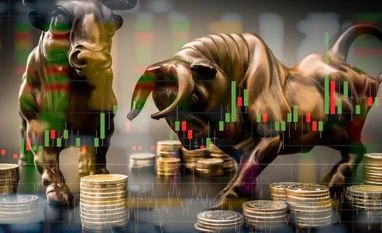China shares lead Asian retreat on Sino-US tensions, euro holds near highs
For once, currencies had dominated trading as a deal on a European Union recovery plan shot the euro to its highest since late 2018
)
By Wayne Cole
SYDNEY (Reuters) - Asian shares skidded from six-month peaks on Friday as Sino-U.S. tensions soured what had been an upbeat week, while the euro held near a 21-month top against the embattled dollar and gold neared a record high.
For once, currencies had dominated trading as a deal on a European Union recovery plan shot the euro to its highest since late 2018. The single currency was last holding at $1.1602 having climbed 1.5% for the week so far.
That was taken as a signal to sell the dollar, which was down 1.4% on the week against a basket of currencies at 94.645 and heading for its fifth straight weekly loss.
It also breached the March low of 94.650 to reach depths not visited since late 2018.
Also Read
"The USD bear case continues to sharpen with a break of the 94.65 March lows likely ushering in the next leg down," said Westpac analyst Richard Franulovich.
"Europe has reached a major milestone in its fiscal arrangements, the Recovery Fund amounting to a European Treasury that will fund EU expenditure via capital market borrowing."
He noted the dollar faced a major hurdle next week when a Federal Reserve policy meeting was likely to take a very dovish lean as the spread of the coronavirus threatened recovery.
For equity markets, the mood darkened after Beijing ordered the United States to close its consulate in Chengdu, in retaliation for being told to shut its consulate in Houston earlier this week.
Chinese blue chips retreated 3.7% as a result, wiping out a week of gains.
MSCI's broadest index of Asia-Pacific shares outside Japan lost 1.7%. Tokyo was closed for a holiday, but Nikkei futures were trading 350 points below the last cash close.
E-Mini futures for the S&P 500 edged down 0.3%, while EUROSTOXX 50 futures eased 1.1% and FTSE futures 1.0%.
The market's dogged optimism on economic recovery had been challenged on Thursday by data showing the number of Americans filing for unemployment benefits unexpectedly rose last week for the first time in nearly four months.
Analysts said there were some technical reasons for the surprise but noted claims were still more than double their worst weekly levels seen during the global financial crisis.
It came as U.S. law makers struggled to agree on a new round of stimulus measures ahead of the expiry of desperately needed unemployment benefits.
All of which was enough to see the Dow end Thursday down 1.31%, while the S&P 500 shed 1.23% and the Nasdaq 2.29%.
The high-flying tech sector lost some altitude after a tech watchdog group reported that Apple Inc faces consumer protection investigations in multiple states.
"In the bigger picture, this news likely represents just a foretaste of what is likely to come post the November U.S. elections by way of stepped up antitrust/anti-monopoly investigations of 'Big Tech', including Google and Facebook, as well as EU-orchestrated efforts for a new digital tax regime for global technology behemoths," said Ray Attrill, head of FX strategy at NAB.
GOLD SHINES
In bond markets the ocean of liquidity provided by global central banks is keeping prices buoyed so that yields on 10-year U.S. paper enjoyed their lowest close since mid-April at 0.5774% and the whole yield curve flattened.
The combination of super-loose money and negative real bond yields has burnished the attractiveness of gold, which pays no yield but is supply constrained.
The precious metal was last at $1,1886 an ounce having climbed 4.3% so far this week to its highest since September 2011. That put it within striking distance of the all-time peak at $1,920.
Analysts at RBC Capital Markets noted gold-backed exchange traded product holdings had already reached record peaks.
"The level of COVID-19 uncertainty, low and negative real and nominal rates, politics and geopolitics have driven gold prices sharply higher, and pushed allocations among investors ever higher," they said in a note.
Oil prices were ending the week on a flat note, having failed to hold a five-month high as worries about global demand offset a weaker U.S. dollar.
Brent crude futures nudged up 16 cents to $43.47 a barrel, while U.S. crude gained 9 cents to $41.16.
(Editing by Simon Cameron-Moore and Kim Coghill)
(Only the headline and picture of this report may have been reworked by the Business Standard staff; the rest of the content is auto-generated from a syndicated feed.)
More From This Section
Don't miss the most important news and views of the day. Get them on our Telegram channel
First Published: Jul 24 2020 | 12:53 PM IST


